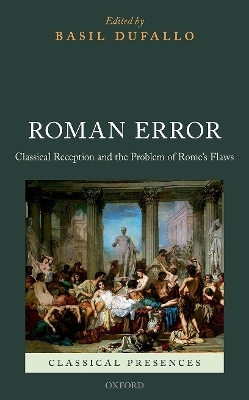
Roman Error
Classical Reception and the Problem of Rome's Flaws
Seiten
2017
Oxford University Press (Verlag)
978-0-19-880303-4 (ISBN)
Oxford University Press (Verlag)
978-0-19-880303-4 (ISBN)
In the eyes of posterity, ancient Rome is deeply flawed; yet its faults have not only provoked censure but also inspired wayward and novel forms of thought and representation. This volume is the first to examine this phenomenon in depth, demonstrating that the reception of Roman "errors" has been far more complex than sweeping denunciation.
In the eyes of posterity, ancient Rome is deeply flawed. The list of censures is long and varied, from political corruption and the practice of slavery, to religious intolerance and sexual immorality, yet for centuries the Romans' "errors" have not only provoked opprobrium, but also inspired wayward and novel forms of thought and representation, themselves errant in the broad sense of the Latin verb. This volume is the first to examine this phenomenon in depth, treating examples from history, philosophy, literature, psychoanalysis, and art history, from antiquity to the present, to examine how the Romans' faults have become the basis for creative experimentation, for rejections of prevailing ideology, even for comedy and delight. In demonstrating that the reception of Rome's missteps and mistakes has been far more complex than simply denouncing them as an exemplum malum to be shunned and avoided, it argues compellingly that these "alternative" receptions are historically important and enduringly relevant in their own right. "Roman error" comes to signify both ancient misstep and something that we may commit when engaging with Roman antiquity, whereby reception may even be conceived as "error" of a kind: while the volume ably addresses popular fascination with a wide range of Roman vices, including violence, imperial domination, and decadence, it also asks us to consider what makes certain receptions matter, how they matter, and why.
In the eyes of posterity, ancient Rome is deeply flawed. The list of censures is long and varied, from political corruption and the practice of slavery, to religious intolerance and sexual immorality, yet for centuries the Romans' "errors" have not only provoked opprobrium, but also inspired wayward and novel forms of thought and representation, themselves errant in the broad sense of the Latin verb. This volume is the first to examine this phenomenon in depth, treating examples from history, philosophy, literature, psychoanalysis, and art history, from antiquity to the present, to examine how the Romans' faults have become the basis for creative experimentation, for rejections of prevailing ideology, even for comedy and delight. In demonstrating that the reception of Rome's missteps and mistakes has been far more complex than simply denouncing them as an exemplum malum to be shunned and avoided, it argues compellingly that these "alternative" receptions are historically important and enduringly relevant in their own right. "Roman error" comes to signify both ancient misstep and something that we may commit when engaging with Roman antiquity, whereby reception may even be conceived as "error" of a kind: while the volume ably addresses popular fascination with a wide range of Roman vices, including violence, imperial domination, and decadence, it also asks us to consider what makes certain receptions matter, how they matter, and why.
Basil Dufallo is Associate Professor of Greek and Latin at the University of Michigan. He is the author of two monographs - The Ghosts of the Past: Latin Literature, the Dead, and Rome's Transition to a Principate (The Ohio State University Press, 2007) and The Captor's Image: Greek Culture in Roman Ecphrasis (OUP, 2013) - as well as articles on Latin literature and Roman culture, and has also co-edited, with Peggy McCracken, the volume Dead Lovers: Erotic Bonds and the Study of Premodern Europe (University of Michigan Press, 2006).
FRONTMATTER; ENDMATTER
| Erscheinungsdatum | 17.02.2018 |
|---|---|
| Reihe/Serie | Classical Presences |
| Zusatzinfo | 9 black-and-white illustrations |
| Verlagsort | Oxford |
| Sprache | englisch |
| Maße | 143 x 224 mm |
| Gewicht | 482 g |
| Themenwelt | Kunst / Musik / Theater ► Kunstgeschichte / Kunststile |
| Geschichte ► Allgemeine Geschichte ► Vor- und Frühgeschichte | |
| Geschichte ► Allgemeine Geschichte ► Altertum / Antike | |
| Geisteswissenschaften ► Geschichte ► Regional- / Ländergeschichte | |
| Geisteswissenschaften ► Philosophie ► Philosophie Altertum / Antike | |
| Geisteswissenschaften ► Sprach- / Literaturwissenschaft ► Anglistik / Amerikanistik | |
| Geisteswissenschaften ► Sprach- / Literaturwissenschaft ► Literaturwissenschaft | |
| ISBN-10 | 0-19-880303-6 / 0198803036 |
| ISBN-13 | 978-0-19-880303-4 / 9780198803034 |
| Zustand | Neuware |
| Haben Sie eine Frage zum Produkt? |
Mehr entdecken
aus dem Bereich
aus dem Bereich
auf den Spuren der frühen Zivilisationen
Buch | Hardcover (2023)
C.H.Beck (Verlag)
CHF 27,95
Konzepte – Methoden – Theorien
Buch | Softcover (2024)
UTB (Verlag)
CHF 55,85
Was Pompeji über uns erzählt
Buch | Hardcover (2023)
Propyläen (Verlag)
CHF 44,75


